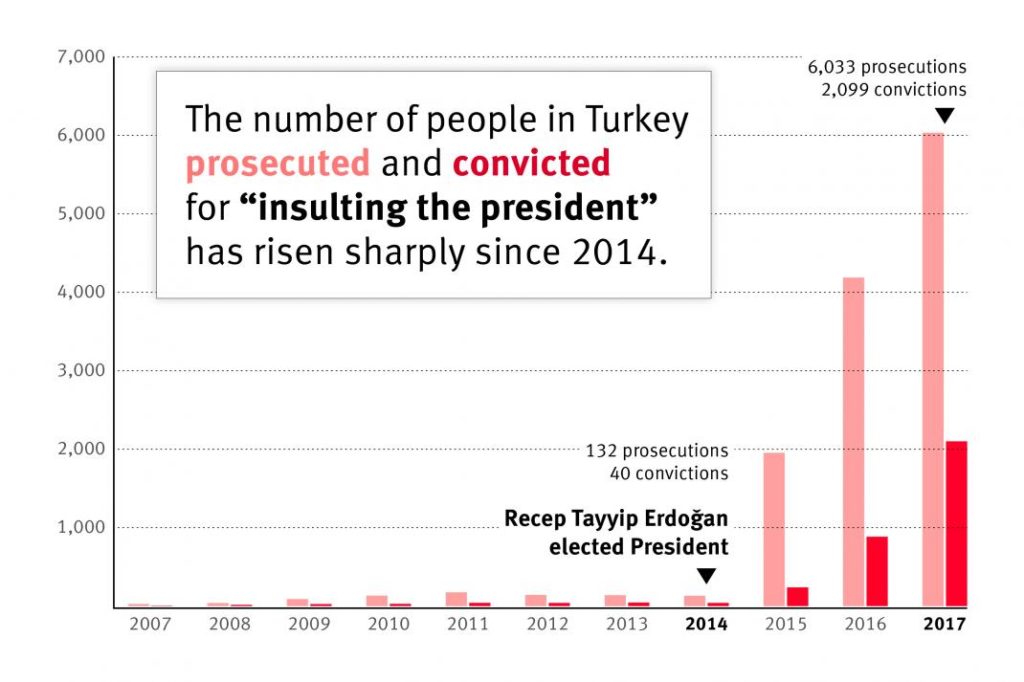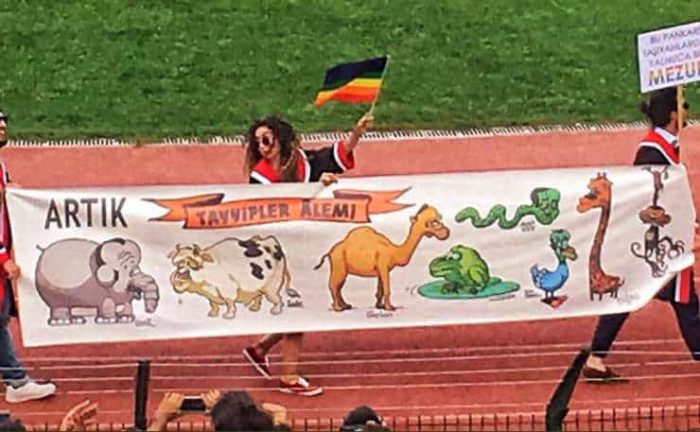“‘Insulting the president’ should not be a crime, and students holding up a satirical banner obviously should never have faced prosecution,” said Benjamin Ward, Europe and Central Asia acting director at Human Rights Watch (HRW).
“Turkish courts have convicted thousands of people in the past four years simply for speaking out against the president. The government should stop this mockery of human rights and respect people in Turkey’s right to peaceful free expression,” said Ward.
Turkish President Recep Tayyip Erdoğan has chosen to drop a complaint against four Ankara students he accused of “insulting the president” for holding up a satirical banner, Human Rights Watch said on Wednesday.
The students’ trial is due to begin on Oct. 22, but the prosecutor is likely to seek their acquittal following the announcement that the president has withdrawn his complaint. While the move is a positive and welcome development for the four students scheduled for trial, it does not address the wider problem of thousands of similar ongoing cases in the courts which blatantly violate freedom of expression, the organization said.
The case is one of many such prosecutions for the same offense over the past four years and relies on Article 299 of the Turkish Penal Code (TCK), a provision rarely used before Erdoğan was elected president in 2014. Human Rights Watch first reported a rising number of prosecutions for “insulting the president” in 2015, and the numbers are increasing.
The students, D.C.Y., B.A., F.E.D. and Ö.K., identified only by their initials for their protection, were detained after their July 6 graduation ceremony at Ankara’s Middle East Technical University. There is a university tradition that graduating students mark the ceremony by holding up humorous and satirical banners, many of them reflecting current developments in Turkey.
Among the hundreds of banners, three students carried a banner with the caption “Now it’s … Kingdom of the Tayyips,” depicting animals drawn with the president’s face. The caricature was based on a 2005 cover image from Turkey’s satirical magazine Penguen.
Police detained the students at their homes following a complaint by a lawyer acting for Erdoğan. On July 11, 2018, an Ankara court ordered they be placed in pretrial detention pending trial. A fourth student, Ö.K., who helped the others transport the banner to the campus, was also charged with the same offense and remanded into custody a day later. The court ordered the four released on Aug. 10. Ş.D., manager of the stationery shop that printed the banner, was charged with the same offense and faces trial with the students on Oct. 22.

Prosecutions under Article 299 of the TCK for “insulting the president” require the minister of justice’s permission and carry potential prison sentences of one to four years. They have risen dramatically from 132 in 2014 to more than 6,000 in 2017. Courts have often suspended sentences or converted them to fines. Using the article to prosecute journalists, academics, juveniles and ordinary people for social media postings, a phenomenon since Erdoğan became president, is a direct assault on freedom of expression and critical speech devoid of advocacy or incitement to violence.
When the images were first published by Penguen on Feb. 24, 2005, Erdoğan, then prime minister, filed a defamation lawsuit and sought damages from the magazine of 40,000 Turkish lira (approximately $31,000). An Istanbul court rejected the lawsuit and ruled that the caricature fell within the boundaries of freedom of expression and was not defamatory.
On July 17, 2018, the chair of the main opposition Republican People’s Party (CHP), Kemal Kılıçdaroğlu, tweeted the “Kingdom of Tayyips” caricature, saying: “You must tolerate criticism and humor, you have to! You cannot stop criticism and humor by putting them in prison.” The next day, the Ankara public prosecutor’s office initiated a preliminary investigation into him for insulting the president.
Other CHP parliamentarians also shared the caricature on Twitter to support the students. Erdoğan’s lawyers have filed criminal complaints against 72 CHP parliamentarians for insulting the president because they tweeted the banner image. Members of parliament enjoy immunity and cannot be questioned by the prosecutor’s office while they are serving parliamentarians unless that immunity is stripped in accordance with the law.
Turkey is a party to the European Convention on Human Rights and the International Covenant on Civil and Political Rights, and is legally bound under both to respect freedom of expression. The European Court of Human Rights has made clear that any efforts to protect a head of state “cannot justify conferring on him or her a privilege or special protection vis-à-vis the right to … express opinions about him or her.”
Satirical speech enjoys special protection as a form of artistic expression and social commentary, and the court routinely finds that charges of “insulting the president” violate the convention, noting that criminalization of satire would have a deterrent effect on the free debate of questions of general interest. United Nations and regional experts on freedom of expression have called for repeal of all laws that provide special protection for public figures.
“Turkey should stop throttling free speech through misuse of the criminal law and behave like a democratic society based on rule of law and respect for human rights,” Ward said. “Decisions by prosecutors and courts to start or drop cases should not rest on the word of the president.”



